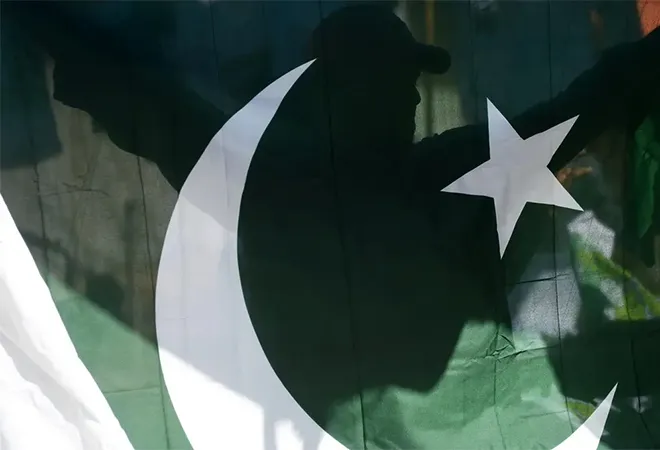
The Tehreek-e-Taliban Pakistan (TTP) recently announced a three-month
ceasefire unilaterally, following which Pakistan’s Information Minister Marriyum Aurangzeb confirmed ongoing peace negotiations between Islamabad and the outlawed terrorist group. Taking centre stage, the Afghan Taliban
acknowledged their role as the mediators in the deadlock between Pakistani officials and TTP leaders.
Pakistan had sent a
secret delegation to Afghanistan to hold talks with the TPP earlier in January. The effort to revive the negotiations is in light of the TTP’s intensifying assaults against the Pakistani security force and to
pre-empt the TTP-Islamic State-Khorasan (IS-K) nexus.
These negotiations, with the Afghan Taliban as a mediator, set a dangerous precedent as it could encourage transnational terrorist outfits to create pressure on other regional actors to gain concessions while giving the Afghan Taliban leverage.
The effort to revive the negotiations is in light of the TTP’s intensifying assaults against the Pakistani security force and to pre-empt the TTP-Islamic State-Khorasan (IS-K) nexus.
TTP upping the ante
Once considered a spent force after the massive Pakistani
offensive in 2014, the outlawed group has re-emerged and is emboldened by Kabul’s fall to the Afghan Taliban. Operating from the border areas of Afghanistan, in January 2022, the group carried
out 42 attacks and in 2021, it claimed 282 attacks—an
increase of 84 percent relative to 2020.
Shrouded in secrecy, the next steps of the negotiations are not clear. The TTP is making two major demands. First, it seeks the reduction of Pakistani military forces from the former tribal areas of Federally Administrated Tribal Areas (FATA). Second, it wants the ‘
FATA merger’ reversed. The merger reversal
will not be considered under any circumstances considering it is a parliamentary decision.
With the spike in attacks, the negotiations with an armed non-state like TPP indicates the prowess of its violent campaign in Pakistan. The group is likely to gain confidence as a state actor has conceded to share a table with it. Entering into peace talks hints toward Islamabad’s inability to cope with the losses which can translate to inadvertently legitimising the TTP.
Increased concessions would empower the group to pressure Islamabad further. This can have serious consequences as it can escalate the security environment in the region given that many terrorist groups are operating along the Afghan-Pakistan border.
On top of that, recent releases and pardons granted to militants by Islamabad will make it difficult for Pakistani negotiators to push TTP to disarm and only allows it to rebuild itself. Additionally, pushing itself into mainstream politics in Pakistan, the TTP, for example, despite having deep ideological differences has
supported the politics of Baloch and Pashtun nationalists.
The Taliban’s position is primarily shaped by its deep ties and reliance on Pakistan. Islamabad is seeking for the TTP to dissolve, in favour of peaceful resettlement, and to put an end to their insurgency against Pakistan.
From a threat allegedly funded by foreign entities to sitting at the table with them highlights the weak position that Islamabad is in. Therefore, it raises doubts about Pakistan’s ability to address regional actors’ security concerns as it cannot resolve its own despite having dealt with militant groups at home and abroad.
TTP factor in Pakistan-Afghan Taliban relations
The Taliban’s position is primarily shaped by its deep ties and reliance on Pakistan. Islamabad is seeking for the TTP to dissolve, in favour of peaceful resettlement, and to put an end to their insurgency against Pakistan. The group says it will not lay down its arms unless it achieved its ultimate goal of Sharia being implemented in Pakistan. Thus, making the chances of a peace deal even slimmer.
There has been mounting Pakistani pressure on the Afghan Taliban, especially after Pakistan’s
airstrikes in April in eastern Afghanistan. Yet, the Afghan Taliban seem to have done the bare minimum by pushing the TTP to the negotiation table.
It is visible that the Taliban is unwilling to reverse its alliance with the TTP, as Siraj Haqqani, acting interior minister in Kabul,
commended the TTP for its contribution to the insurgency against the previous Afghan government and the US, giving the Afghan Taliban strategic breathing room to offset its reliance on Pakistan.
The fulfilment of TTP’s demand would indirectly help the Afghan Taliban to achieve its expansionist position on the Afghanistan-Pakistan border.
In the deadlock between the TTP and Pakistan, the Afghan Taliban have ostensibly not taken any sides. However, the Taliban seems to be backing TTP’s demands covertly, especially for reversing the FATA merger and reducing Pakistani military forces in the border region. The fulfilment of TTP’s demand would indirectly help the Afghan Taliban to achieve its expansionist position on the Afghanistan-Pakistan border. The border has been a major point of contention between the two neighbours with persistent border
clashes between security forces.
Implications for regional actors
Transnational terrorism is a key concern for Afghanistan’s neighbours and most dialogues have been centred around counterterrorism measures. A UN Security Council assessment
concluded, “terrorist groups enjoy greater freedom in Afghanistan than at any time in recent history”. The Afghan Taliban leadership have been providing assurances that
they ‘‘will not allow anyone to use our territory to threaten the security of other countries.’’
Regional stakeholders like India, Iran, China, Russia and Central Asian states share their interest in a secure and stable Afghanistan. This is crucial for their concerns regarding regional connectivity, however, a year since the fall of Kabul to the Taliban, the situation continues to remain bleak.
Given that the Afghan Taliban share links with most of these groups, regional actors will have to tread cautiously in their engagement. The Afghan Taliban’s lack of serious action against the TTP is an example of their commitment to preventing Afghanistan from further harbouring transnational terrorist groups.
The Afghan Taliban’s lack of serious action against the TTP is an example of their commitment to preventing Afghanistan from further harbouring transnational terrorist groups.
In
April this year, the Islamic State-Khorasan claimed to have attempted missile attacks on Uzbekistan. Although Uzbek authorities denied such an attack, such claims prove that existing terror outfits directly threaten neighbouring states. There are also reports that under Mahdi Arslan the Tehreek-e-Tajikistan (TTT) has been
established in Badakhshan province. The Afghan Taliban had appointed him as the caretaker of five neighbouring districts of Tajikistan.
The CIA-led drone strike on 1 August 2022, in Kabul,
which resulted in the death of Al-Qaeda supreme leader, Aman Al-Zawahiri, underscored the predicament in dealing with the Afghan Taliban. Antony Blinken, US Secretary of State
declared that Zawahiri’s presence in Kabul violated the 2020 Doha agreement.
This is an eye-opener for New Delhi, which recently sent a ‘‘
technical team’’ to Kabul as an incremental step toward opening its embassy. India has concerns regarding terror outfits like Lashkar-e-Taiba (LeT) and Jaish-e-Mohammed (JeM) who have been
reported to have a presence in Afghanistan. With the role of the Afghan Taliban as a mediator in the TTP-Pakistan peace talks and the revelation of Zawahiri in Kabul, New Delhi should not expect any consequential measures from Kabul and must tread with caution when dealing with the insurgents turned administrators of Afghanistan.
The views expressed above belong to the author(s). ORF research and analyses now available on Telegram! Click here to access our curated content — blogs, longforms and interviews.



 The Tehreek-e-Taliban Pakistan (TTP) recently announced a three-month
The Tehreek-e-Taliban Pakistan (TTP) recently announced a three-month  PREV
PREV


